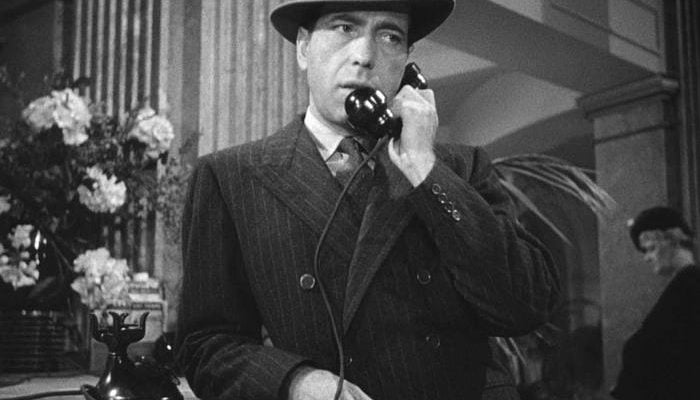Have you ever wondered what it is about crime novels that keeps readers hooked? The answer lies deep within our psyche. There’s an innate human desire to solve puzzles, and crime novels, filled with suspense and enigma, tap right into that.
But the appeal doesn’t end there. Detective movies also cater to this thirst. Picture a dimly lit room, a fictional detective sifting through clues, the anticipation building. There’s something irresistibly intriguing about watching someone piece together a puzzle we couldn’t. The cunning antagonist, the unexpected twists, and the final revelation – they all create a cinematic dance of mind games.
Now, as we are set to explore the 10 Most Brilliant Fictional Detectives, it’s worth diving into why they, and their thrilling tales, have such a profound impact on us.
10 – Kay Scarpetta: The Forensic Pioneer
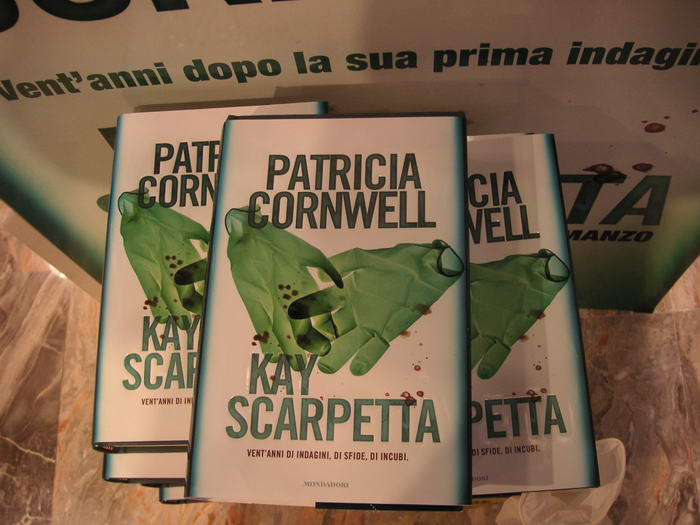
In the universe of fictional detectives, Dr. Kay Scarpetta stands out as an avant-garde, primarily for her profound expertise in forensic pathology. Patricia Cornwell, the genius behind Scarpetta, introduced readers to a character who was at once sharp, resilient, and inherently human. As Chief Medical Examiner, Scarpetta’s approach to crime-solving leans heavily on her analytical skills, scientific precision, and a deep-rooted quest for justice.
Scarpetta’s world is not merely about post-mortems and evidence analysis. It’s also a world rife with personal challenges, intricate relationships, and the eternal battle against dark forces, both external and within. Cornwell’s narratives often explore the human psyche behind criminal behavior, making Scarpetta’s adventures as much a psychological exploration as they are investigative.
In an era where detective stories often lean on the physical chase, Scarpetta’s adventures are cerebral, drawing readers into the labyrinthine world of forensic science. A trendsetter in her field, Dr. Kay Scarpetta inspired an entire generation to look at crime-solving from a fresh, scientific perspective.
09 – Sam Spade: The Quintessential Private Eye
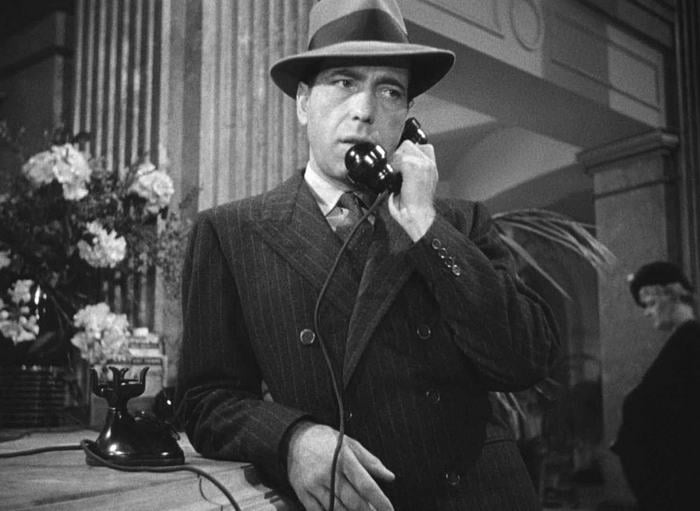
When we think of private detectives in fedoras, navigating the murky underbelly of a city, Sam Spade is often the first name that comes to mind. Crafted by the brilliant Dashiell Hammett, Spade is the protagonist of the novel “The Maltese Falcon,” and he has since become the gold standard for all private detective characters.
Spade’s world is one of deception, treachery, and often, moral ambiguity. He’s not your typical white knight; instead, he’s a complex character with his own set of values, working the gray areas of legality. His interactions, particularly with the femme fatales, showcase a detective who’s wise beyond his years, perpetually wary, yet vulnerable to the intricate web of emotions and relationships.
Hammett’s narrative technique, coupled with Spade’s unique character blueprint, has led to the evolution of the hard-boiled detective genre. Spade isn’t just solving crimes; he’s navigating human frailties, societal corruption, and personal demons, making his tales perennially compelling.
08 – Harry Bosch: The Relentless Pursuer of Truth
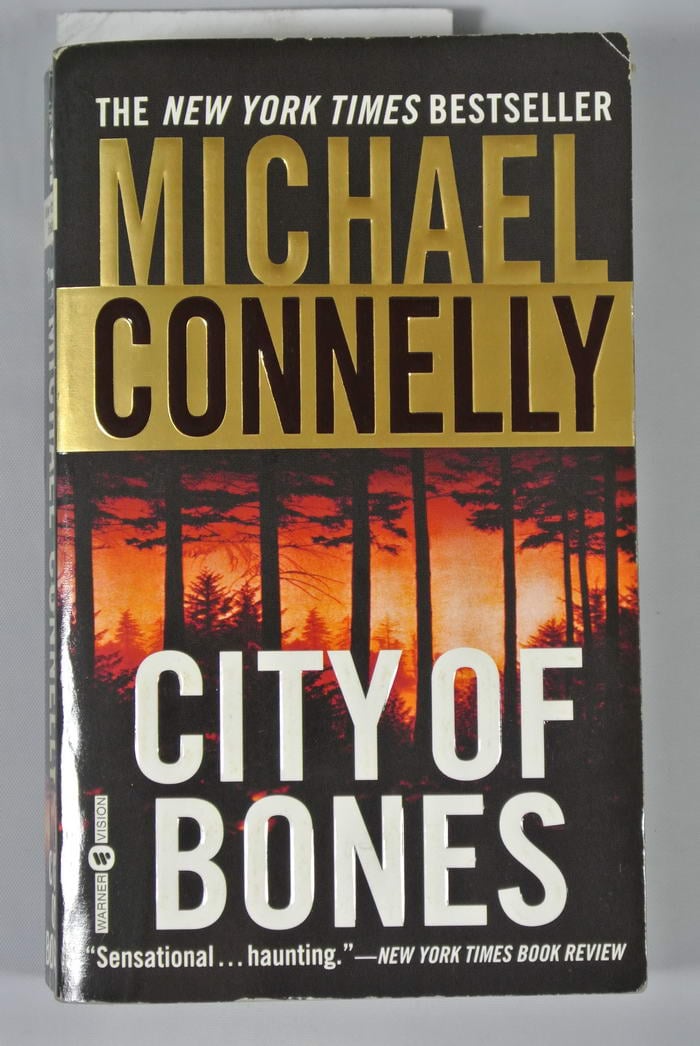
Michael Connelly’s Hieronymus “Harry” Bosch is more than just a detective; he’s a portrayal of relentless pursuit in the face of insurmountable odds. Named after the 15th-century Dutch artist, Bosch dives into the dark recesses of LA’s crime world, much like the painter delved into surrealistic and often dark themes.
Bosch, a Vietnam war veteran turned LAPD detective, is driven by an innate sense of justice, often putting him at odds with the very institution he serves. Connelly paints Bosch as a lone wolf in a vast urban jungle, striving to bring closure to victims and their families. His cases aren’t mere puzzles; they’re deep explorations into human nature, societal constructs, and the very concept of good vs. evil.
Throughout the series, readers are privy to Bosch’s personal journey too—his struggles, his past, and his quest for identity. It’s this balance of procedural investigation and deep character study that elevates Harry Bosch from a mere fictional detective to a literary icon.
07 – The Hardy Boys: Youthful Vigor Meets Sleuthing Brilliance
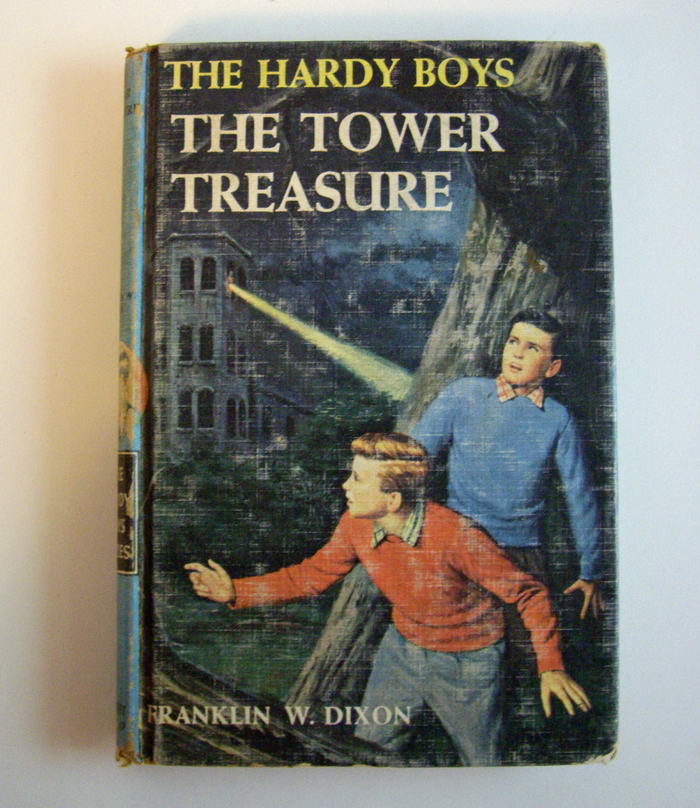
Frank and Joe Hardy, collectively known as The Hardy Boys, are the brainchildren of Edward Stratemeyer, though the books have been penned by various ghostwriters under the pseudonym Franklin W. Dixon. Aimed at a younger audience, these novels successfully combined the thrill of a detective narrative with the relatable struggles of adolescence.
Set in the fictional town of Bayport, these young detectives often find themselves entangled in mysterious affairs far beyond their age. What makes The Hardy Boys stand out is not just their knack for solving mysteries but their indomitable spirit, camaraderie, and the profound sense of brotherhood. They’re role models for young readers, showcasing that age is no barrier to heroism or determination to unveil the truth.
Over the years, the duo’s adventures have evolved, keeping pace with changing times, yet their core essence remains untouched—two brothers using wit, bravery, and a sense of justice to tackle every enigma thrown their way.
06 – Tintin: Globe-Trotting Journalist and Unassuming Hero
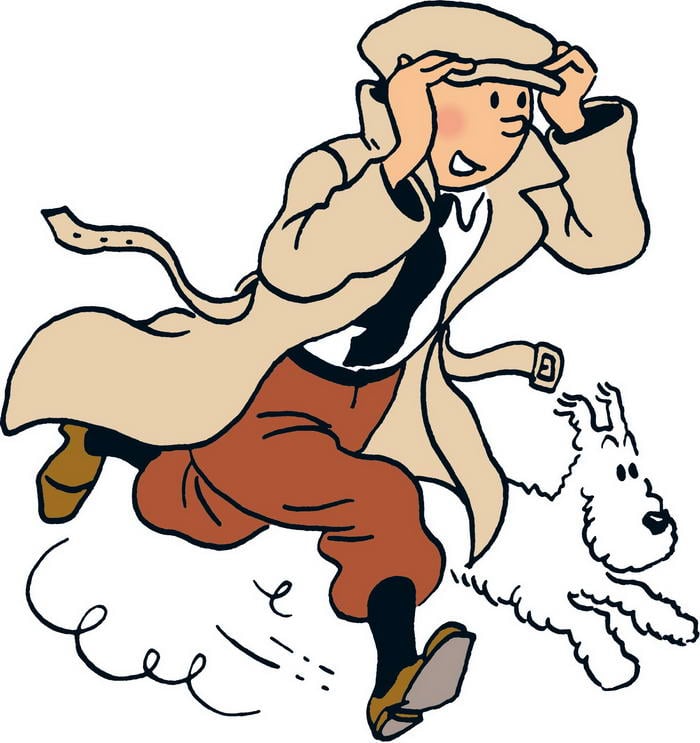
Hailing from Belgium and crafted meticulously by Hergé, Tintin is a young journalist who, with his faithful dog Snowy, finds himself constantly embroiled in adventures that span continents. More than just a detective, Tintin is a symbol of indefatigable curiosity and relentless pursuit of the truth, irrespective of the danger.
Tintin’s narratives aren’t confined to mere detective work. They are grand tales that encompass political intrigue, treasure hunts, and even extraterrestrial encounters. Hergé’s creation offers a mix of humor, sophisticated plots, and, most importantly, a lesson in integrity. Through various cultures, settings, and characters, Tintin’s tales provide readers with a global perspective on justice and morality.
Over the decades, Tintin has become more than a comic book character. He’s an emblem of resilience, intelligence, and a testament to the idea that heroes come in the most unassuming forms.
05 – Philip Marlowe: The Poetic Detective of LA’s Underworld
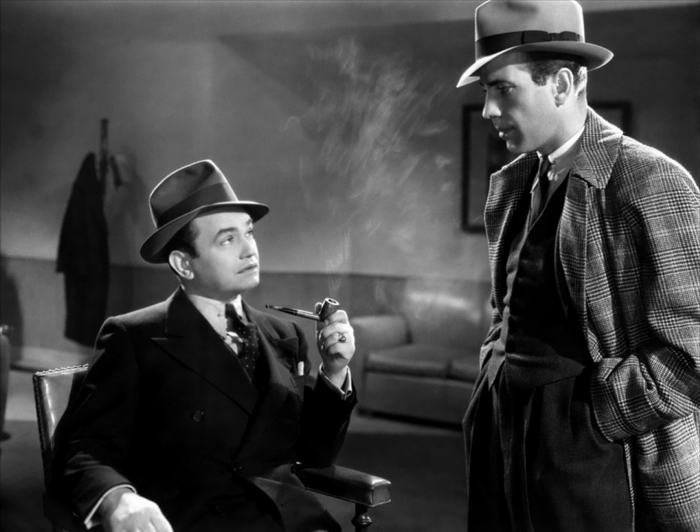
Raymond Chandler’s Philip Marlowe is not just a detective; he’s a literary marvel—a blend of cynicism, wit, and a deep-seated sense of chivalry. Operating in the seedy underbelly of Los Angeles, Marlowe’s cases are less about catching the criminal and more about understanding humanity’s deeper flaws.
With his distinct narrative voice, Marlowe guides readers through a maze of deceit, passion, and moral quandaries, making them ponder on the nature of good and evil. His tales are more than just detective stories; they’re philosophical journeys, questioning societal norms and human motivations. Chandler’s portrayal of LA is not just as a setting but as a character in its own right, with its dark alleys and neon-lit nights hiding myriad secrets.
In a world where detectives often relied on sheer wit or physical prowess, Marlowe stood apart, using his profound understanding of human nature to solve cases, making him one of the most enduring figures in detective literature.
04 – Miss Marple: The Sharp-Witted Dame of St. Mary Mead
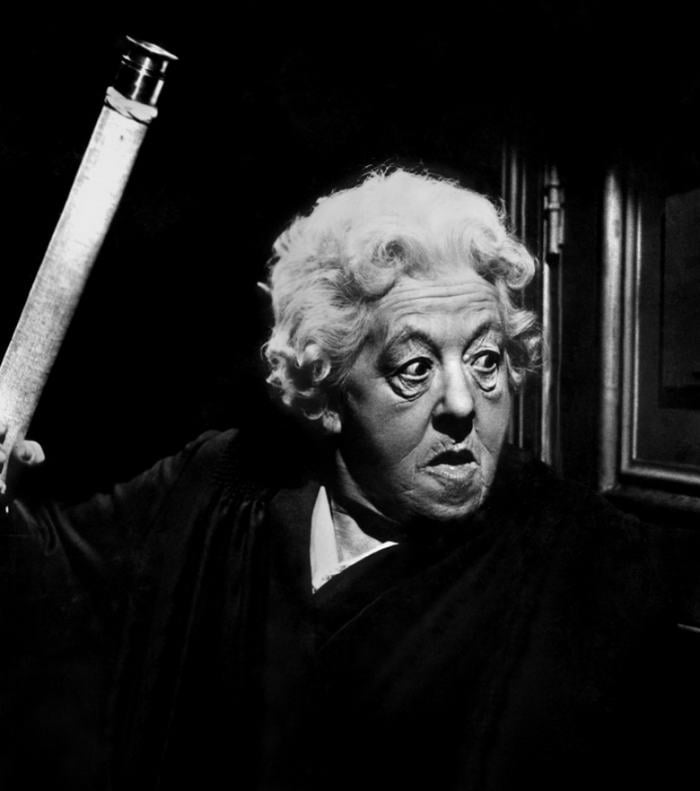
When you think of detectives, the image of a sharp-eyed elderly woman knitting in her armchair might not immediately come to mind. Yet, that’s exactly what makes Miss Jane Marple, Agatha Christie’s iconic creation, so special. Residing in the quaint village of St. Mary Mead, Miss Marple has a knack for unraveling complex mysteries using her profound understanding of human nature.
While she might seem unassuming, her mind is anything but. With an uncanny ability to draw parallels between the village’s goings-on and the grander mysteries she encounters, Miss Marple’s methods are unique. She relies not on modern forensics, but on keen observation and intuitive prowess, often drawing surprising and accurate conclusions from seemingly inconsequential details.
Her tales have become synonymous with cozy British mysteries, intertwining murder with village life, making her one of the most beloved figures in the detective genre.
03 – Inspector Morse: Oxford’s Melancholic Genius
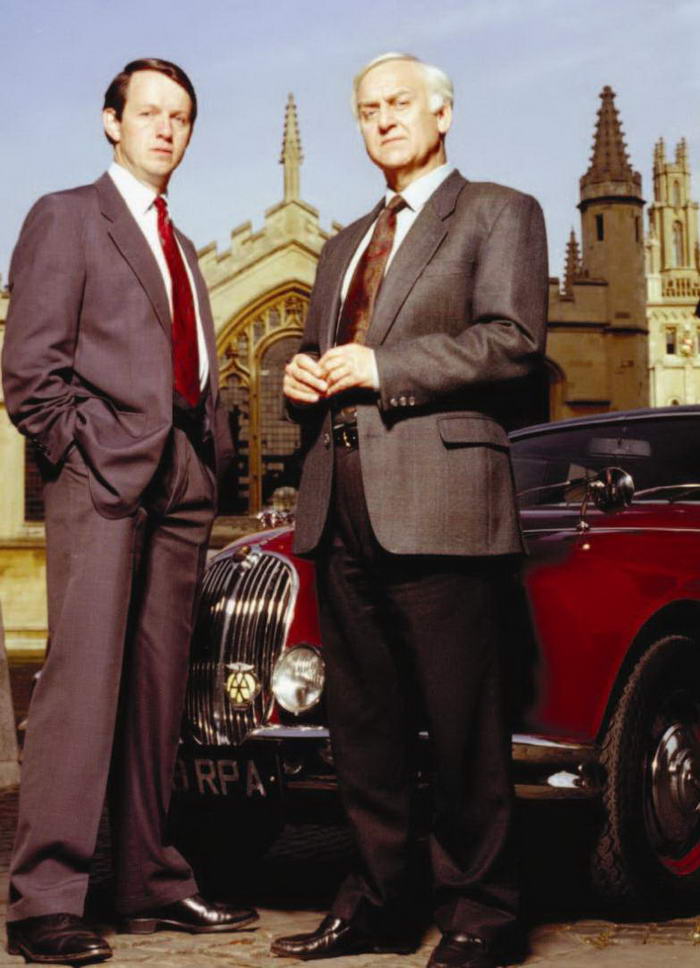
Born from the mind of Colin Dexter, Inspector Endeavour Morse is not your everyday detective. He’s erudite, loves his ale, and has an almost romantic relationship with the city of Oxford. Driven by intellectual challenges rather than mere duty, Morse’s approach to detective work is as unique as his personality.
Armed with an unmatched intellect and partnered with the ever-loyal Sergeant Lewis, Morse navigates through the elite echelons of Oxford, solving cases that often have as much to do with human passions as they do with clues and evidence. His deep love for opera, crosswords, and a penchant for introspection make him a multifaceted character, resonating with readers and viewers alike.
Though sometimes seen as irascible, Morse’s brilliance, coupled with his vulnerabilities, paints a picture of a detective who is profoundly human, making his stories as much about the mysteries of the heart as those of the crime scene.
02 – Sherlock Holmes: The Archetypal Mastermind of Baker Street
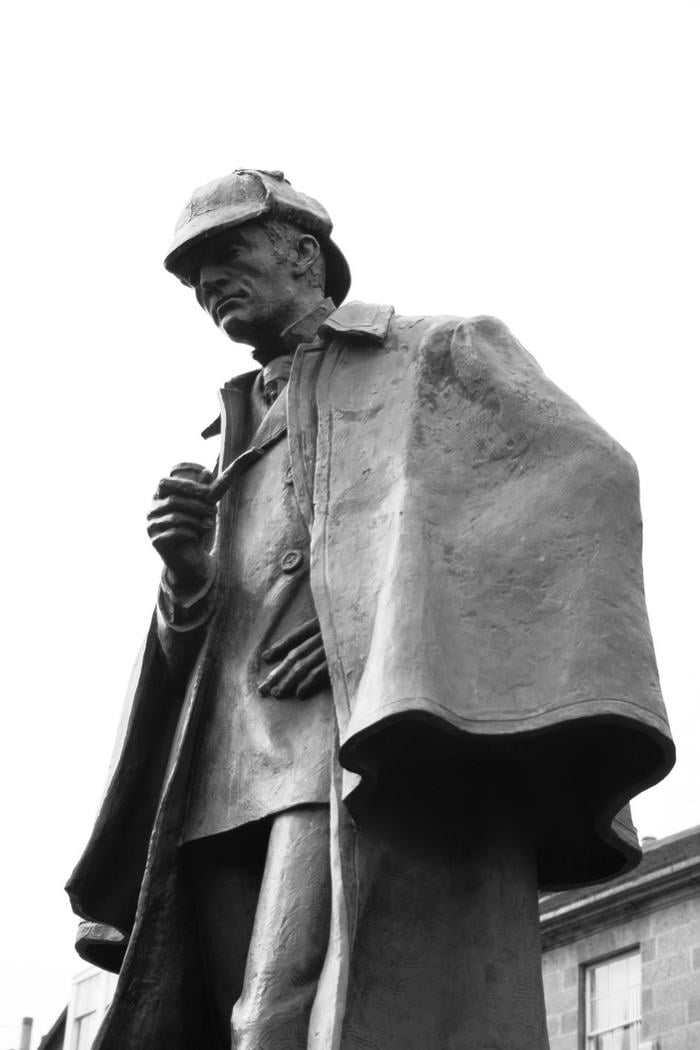
Sir Arthur Conan Doyle didn’t just create a detective when he penned down Sherlock Holmes; he birthed a legend. Holmes, with his iconic deerstalker hat, pipe, and magnifying glass, is a towering figure in the world of detective fiction. Operating from his Baker Street apartment in London, Holmes, with his faithful friend Dr. John Watson, has tackled some of the most intriguing and baffling cases in literary history.
Undoubtedly, Holmes’s methods are groundbreaking. His deductions, often bordering on the miraculous, are rooted in his acute powers of observation and a scientific mind. His adventures, ranging from battling with his nemesis Moriarty to solving mysteries like ‘The Hound of the Baskervilles’, have set a gold standard in detective narratives.
Holmes’s influence is pervasive, inspiring countless adaptations, reimaginings, and parodies. His legacy is not just in the cases he solved but in the methodological approach he adopted, making him, arguably, the most celebrated detective in fiction.
01 – Hercule Poirot: The Belgian Detective with an Unparalleled Grey Cell
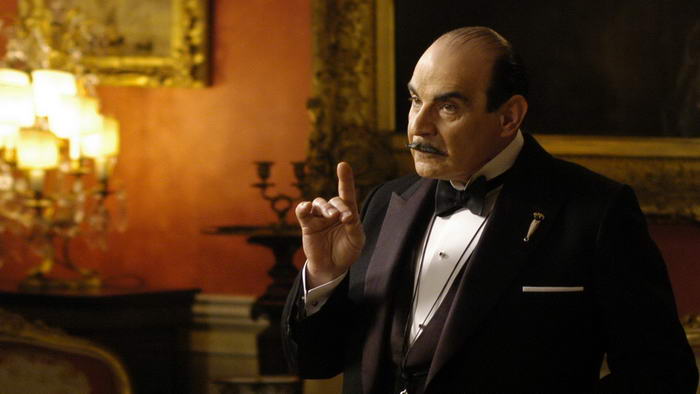
Arguably one of the most iconic detectives ever penned, Hercule Poirot, another of Agatha Christie’s brilliant creations, is as memorable for his sharp intellect as he is for his meticulous personality and distinctive mustache. The little Belgian detective, with his egg-shaped head and obsession for symmetry, operates on one principle: using his “little grey cells”.
Poirot’s detective methods contrast sharply with many of his contemporaries. While others might rely heavily on physical evidence or lengthy stakeouts, Poirot’s strength lies in his ability to understand the intricacies of the human psyche. He firmly believes that every crime has a motive and understanding that motive is the key to unraveling the mystery.
Some of his most famous cases, like “Murder on the Orient Express” and “Death on the Nile,” showcase his unique method of sitting back, contemplating, and letting his brain do the work. His analytical prowess combined with his idiosyncratic nature makes Hercule Poirot a standout in the world of fictional sleuths, leaving readers continually enthralled by his adventures.
Why the World Can’t Get Enough of Mysteries
Every decade has its share of defining literary trends, but there’s one genre that seems to transcend time: the mystery novel. If we were to investigate (pun intended!) this unceasing love affair, we’d find a blend of human psychology, societal shifts, and pure narrative craftsmanship at play.
Our modern world, with its technological advancements and breakneck pace, often leaves us craving the simplicity and tangible resolution that exciting detective novels offer. The enigmatic clues, heart-stopping revelations, and a final, satisfying conclusion; they all provide a sense of order missing in our daily lives.
But it’s not just the plot twists that keep us hooked. The protagonists, these brilliant fictional detectives, often reflect the ever-changing societal norms, becoming symbols of justice, or sometimes rebellion, in the face of adversity. Their character developments, rooted in intricate backstories, make them more than just flat heroes—they’re reflections of us, our fears, and our aspirations. It’s no wonder that the demand for lists highlighting the greatest fictional detectives never wanes.
Dive Into the Enigma: Crafting a Mesmeric Detective Story
One might argue that a detective narrative is formulaic—there’s a crime, a detective, clues, suspects, and an eventual revelation. But any avid reader or movie buff knows that the real magic is in the nuances.
So, what elevates a detective story from the mundane to the mesmerizing? It’s a cocktail of character depth, meticulous plotting, and the sheer unpredictability of human nature. The setting plays a pivotal role too. Imagine the fog-laden streets of Victorian London, casting shadows and doubt in equal measure, or the neon-lit alleys of a futuristic city where every corner hides a secret.
Moreover, an engaging detective story often pushes the envelope, venturing into uncharted territories of morality and ethics. When does justice blur into vengeance? Are there really any ‘good’ or ‘bad’ characters, or is everyone a shade of gray? It’s these questions, coupled with edge-of-the-seat suspense, that transform a basic detective plot into a gripping psychological exploration.
Introducing newer elements and unexpected turn of events, like intertwining the plot with elements of fantasy or even paranormal, can further amplify the intrigue. As the boundaries of reality are stretched, so are the limits of our imagination, making every page, every scene, a thrilling journey into the unknown.


